TV for Kids’ Room: Creating a Fun and Educational Space

Choosing the right TV for a kids’ room can be a tricky decision for modern parents who want to offer the best entertainment while still keeping screen time in check.
But what about putting a TV in your child’s bedroom—is that a yay, or a nay?
In this blog post, we’ll explore the pros and cons of having a TV in your child’s room and help you make an informed decision.
Contents:
- Does TV Affect Child Development?
- How Much TV Should a Child Watch?
- How to Stop My Child Watching TV Too Much?
- Stay Safe With Kids360
- Should You Put a TV in Your Child’s Bedroom or Not?
- FAQs
Does TV Affect Child Development?

Evgenyrychko/Shutterstock.com
As parents, we all want our kids to grow up happy, healthy, and well-adjusted. One of the most debated topics among parents and experts when it comes to child development is the impact of TV on our kids. But is television viewing really bad for children? Or are the myths overshadowing the facts?
At its core, TV is not inherently bad for kids. The content and the amount of screen time spent watching TV are the key factors that determine its impact on child development.
Studies show that educational programs such as Sesame Street and Dora the Explorer can help children learn new words, improve their cognitive and social skills, and increase their creativity.
However, excessive watching of general entertainment shows, especially those that involve violence, can lead to shorter attention spans, reduced language development, and behavioral issues.
While screen time can be a temporary distraction for kids, it should not be used as a babysitter. Constant exposure to TV can lead to a sedentary lifestyle and hinder a child’s motivation to explore and learn from the real world.
Not only that, but very young children need face-to-face interactions, physical touch, and stimulation to develop healthy emotional connections and social skills. As parents, we should provide our kids with a mix of TV time and time for physical activity, play, and creative expression.
So what should you do? Banning TV outright can create more harm than good. Children who grow up in households with strict TV rules may feel deprived and may become more likely to watch TV in secret at friends’ houses or other places.
A better approach is to set reasonable limits on screen time and be vigilant about what kind of content your child is watching. Experts recommend up to one hour of screen time a day for children under the age of five and up to two hours for kids over five.
Whenever you can, watch TV with your kids and discuss the content—don’t just plop your child down in front of the screen and call it a day.
And remember, the type of content your child is exposed to can have a profound effect on their development. Violence, commercials, and exploitative content can lead to negative effects on a child’s emotional health, language development, and behavior. As a parent, take control of your child’s TV diet and opt for shows and channels that offer educational content, promote empathy, and steer clear of violence.
The same applies to screen time overall, so you should apply this rule with video games, too. You want to pick educational games that help kids develop various skills. And limit the time spent because your kid might display video game addiction otherwise. Make sure to combine screen time with physical activity, which you can also do together.
Pros and Cons of a Small TV in a Kid’s Room
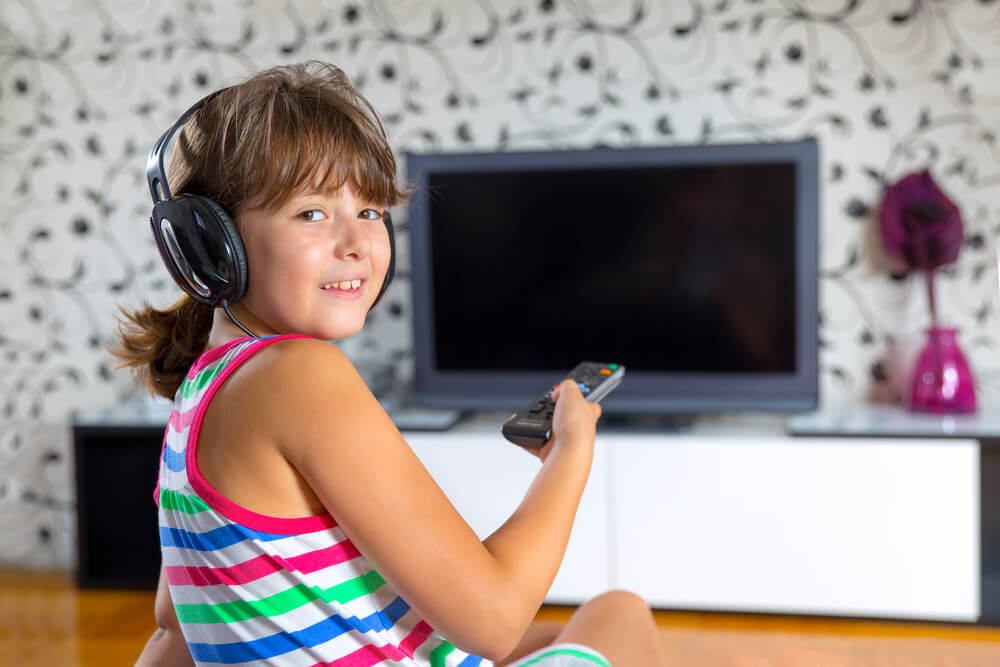
adriaticfoto/Shutterstock.com
Some believe that having a TV in their kids’ room is distracting and detrimental to their development, while others see it as a valuable source of entertainment and learning. The reality is that there’s no right answer—there are both pros and cons of television viewing for kids.
Let’s tackle the pros first.
Pros
- The first and most obvious benefit of having a TV in your kids’ room is entertainment. There’s nothing like curling up in bed and watching a movie or their favorite show after a long day. Allowing your child to relax in a comfortable environment with their favorite programs can help improve their mood and reduce stress levels.
- Plus, by allowing your child to have a TV in their room, you give them a sense of independence and control over their own entertainment choices and screen time. While it’s important to monitor what they’re watching, giving your child the responsibility of choosing what they watch can help foster independence and decision-making skills.
- In addition to entertainment, a TV in your kids’ room can provide valuable educational opportunities. With a wealth of programming geared toward children, you can give your child the chance to learn about new cultures, science, nature, history, and other topics via television viewing.
- Having a TV in your child’s room doesn’t necessarily mean that all screen time has to be done alone. You can also use the TV in their room as a cozy space for family time, such as watching a family movie or playing a video game together. Video games can be a joint and educational activity, provided that you choose titles carefully.
- Finally, having a TV in your kid’s room can provide opportunities for better communication between you and them—when done correctly, of course. By watching TV together, you can start conversations about what they’re watching, their likes and dislikes, and even introduce them to your favorite childhood shows.
Cons
Like anything in life, having a TV in your kid’s room also comes with some trade-offs.
- For one, it can affect a child’s sleep schedule. The blue light emitted from a screen can interfere with the body’s ability to produce melatonin, a hormone that induces sleep. This can lead to difficulty falling and staying asleep, which can impact a child’s performance in school and their overall health. Plus, your child may be more likely to stay up late watching TV, leading to fatigue and crankiness during the day.
- Television viewing in their bedroom can limit a child’s social interactions. Rather than spending time with family or friends, they may prefer to spend their time watching TV alone in their room.
- This can lead to feelings of isolation and loneliness, negatively impacting a child’s mental health. Children need to learn social skills and develop relationships with their peers, which can’t be done in front of a TV.
- Having a TV in their bedroom can lead to unhealthy habits, such as a sedentary lifestyle and poor nutrition. Children may choose screen time rather than engage in physical activity or spend time outside.
- Watching TV in their bedroom can negatively impact a child’s academic performance. Children who watch TV regularly may have difficulty focusing on homework and may be more likely to procrastinate. Excessive screen time also has the potential to limit a child’s exposure to books and other resources, which are essential for learning and development.
How Much TV Should a Child Watch?
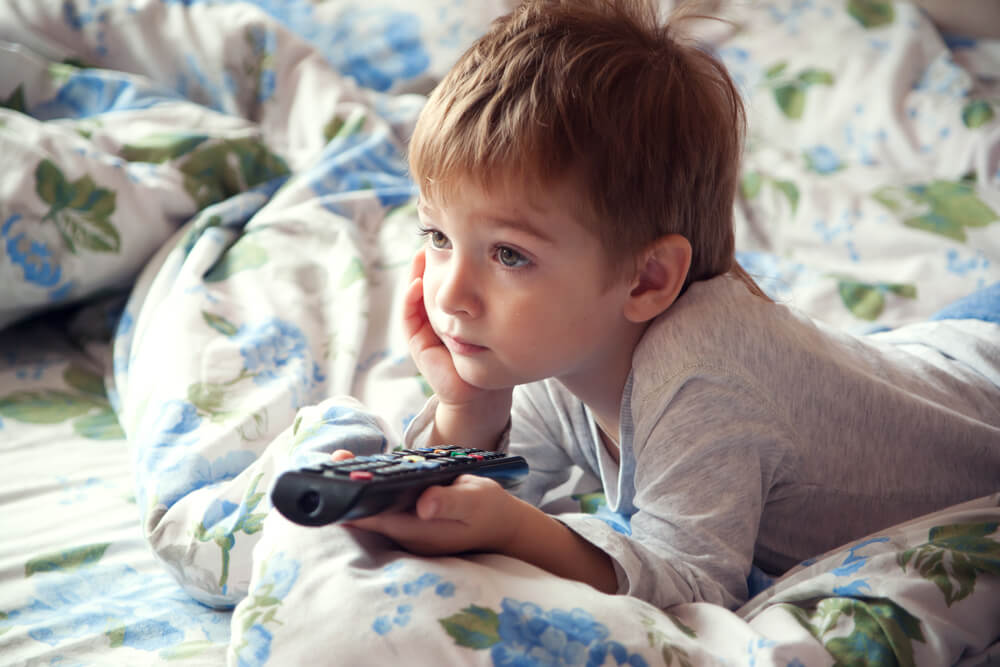
Tatyana Korotun/Shutterstock.com
There’s no denying that TV can be both entertaining and educational, but it all depends on how much your child watches and what they watch.
When it comes to infants and toddlers, the American Academy of Pediatrics recommends avoiding TV for children under 18 months. And for children aged 2 to 5, they suggest that they watch no more than 1 hour a day of high-quality programming.
Why? Too much screen time can be detrimental to early development, including language skills, socialization, and cognitive and physical development. Not to mention that being exposed to any kind of screen close to bedtime can affect sleep quality.
As your child grows older, it becomes more difficult to set clear limits on screen time. At this point, it’s important to consider both the quality and quantity of your child’s TV time. Encourage your child to choose programs that are educational, age-appropriate, and free of violence. It helps to have a TV with smart features since it usually comes with parental controls.
And while it might be tempting to use TV as a babysitter when you need a break, consider using interactive screen time, such as video chatting with family, and encouraging physical activity during breaks to counteract sedentary habits.
In addition to limiting TV time, it’s also important to watch out for any signs that your child’s exposure to screens is affecting their physical or mental health. According to the World Health Organization, children who spend too much time in front of screens may be at risk for obesity, poor mental health, and poor sleep. Signs that your child may be spending too much time watching TV or playing video games include irritability, headaches, and difficulty concentrating.
How to Stop My Child Watching TV Too Much?
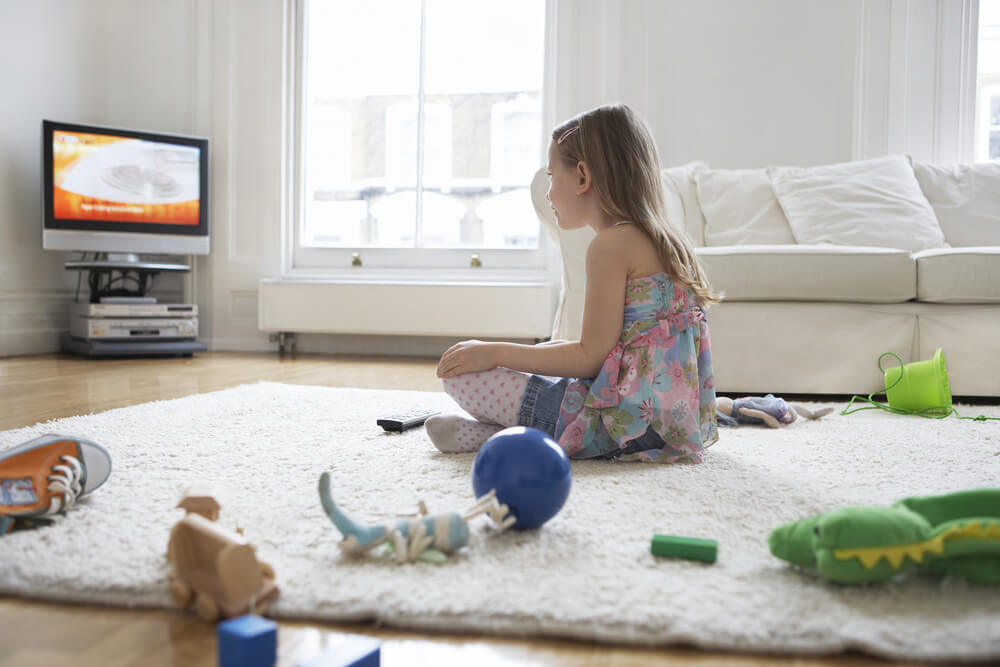
sirtravelalot/Shutterstock.com
Making a schedule can help your child know the exact time they can watch TV. Give them a fixed time of about 30-45 minutes per day and set specific rules that they have to follow. Set realistic screen time limits, as you don’t want to deprive them of their favorite TV shows entirely.
By doing this, you will teach your child that TV is not unlimited and needs to be balanced with other activities.
Encouraging your child to participate in physical activities is an excellent way to prevent them from spending too much time in front of the TV. Enroll them in after-school sports activities or take them on walks or weekend bike rides. It not only keeps their physical health in check but also promotes a healthy lifestyle.
You can also find alternative options for your child’s entertainment. Reading, drawing, playing board games, and doing puzzles are some fun activities that challenge their creativity and improve their cognitive skills. Make sure that these activities are fun and engaging, so your child will be less inclined to choose a TV over them.
Remember, children observe and imitate adults, so it’s crucial to model good behavior. Turn off the TV while eating dinner, and designate time for family activities, such as game night or movie night. In doing so, you show your child that there are other ways to spend quality time with the family that do not involve watching TV.
Want to make streaming safer for your child? Learn how to set limits on platforms like Hulu with our step-by-step guide.
Stay Safe With Kids360
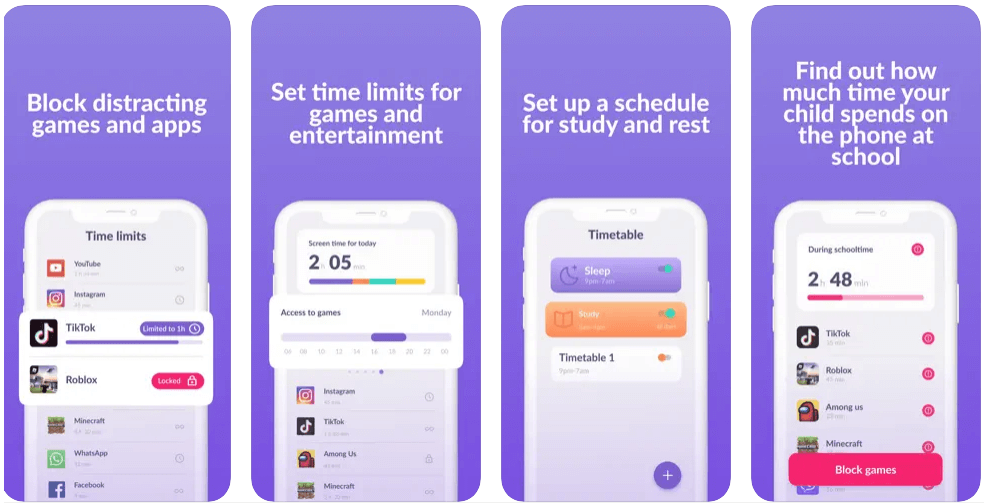
Kids360 app is a useful tool that can help you keep your child safe and protect them from anticipated online dangers—and it can also help you reduce the amount of TV your child watches.
The Kids360 app blocks inappropriate content on your child’s device. You can customize the app to block specific apps, videos, and other online content that you feel is inappropriate or dangerous.
You can also control your child’s screen time and set limits on how much time they can spend on their device. You can create a schedule and set specific time limits for your child to access online content.
Discover the ultimate entertainment experience for kids with the Kids360 app. Download now and enjoy a wide range of engaging and educational content for your little ones!
Should You Put a TV in Your Child’s Bedroom or Not?
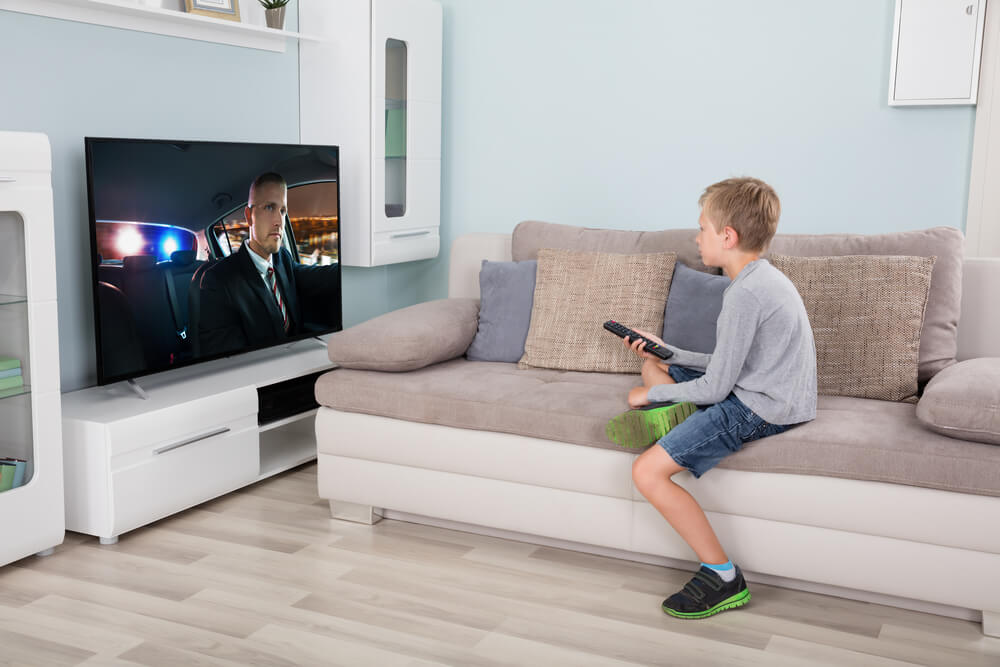
Andrey_Popov/Shutterstock.com
Whether or not you should put a TV in your child’s bedroom really depends on your family’s specific needs and priorities.
While there are certainly some benefits to having a TV in the bedroom, such as convenience and privacy, there are also some significant drawbacks, such as sleep disturbances and health risks.
As a parent, it’s important to weigh the pros and cons carefully and make an informed decision that is in the best interests of your child’s overall health and well-being.
Setting up a smart TV for your child? Don’t forget to block inappropriate websites—here’s a handy list every parent should check: 👉 65+ Inappropriate Websites to Block for Kids.
FAQs

spass/Shutterstock.com
Is it OK to have a TV in a kid’s bedroom?
The answer is yes, but with a lot of caveats. According to the American Academy of Pediatrics, it’s recommended that children under the age of 18 months should not have any screen time. For kids between 2 and 5, it’s recommended that they have only one hour of screen time per day.
At what age should a child have a TV in their room?
The decision to have a TV in your kid’s room depends on their age, their habits, and family dynamics. Before allowing a TV in your child’s bedroom, it’s recommended to discuss the decision with them and set some healthy boundaries.
Why is it good for kids to have a TV in their room?
Having a TV in your child’s bedroom means they get some privacy and independence when it comes to their favorite shows. It could also be a way to bond with your child if you have shared interests, and it may encourage your child to watch educational content.
What is a good TV for kids’ rooms?
Experts don’t recommend a large screen, but you should pick a smart TV for television viewing in kids’ rooms. The maximum size should be 43 inches, and always pick a device with parental controls because you want to control children’s screen time. Roku Smart TV can be a great choice, but you can also consider other options like Toshiba, Fire TV, Samsung, or Insignia.
What is a good-sized TV for a kid’s room?
When selecting a TV for your child’s bedroom, it’s recommended to go for a smaller screen size, ideally between 24 and 32 inches. This size is appropriate for smaller rooms and ensures that your child doesn’t sit too close to the screen, which may impact their eyesight.
Which TV is better for kids’ eyes?
It’s best to go with OLED screen options for television viewing because they come without any flicker and have less blue light than LCD and LED. OLED technology is a wise choice if your kid is old enough to also play video games on their smart Android TV.
Is it okay for kids to sleep with the TV on?
Most experts indicate it’s best that there be no TV in the children’s room. But some kids fall asleep faster when there’s an option of television viewing before sleep. Screen time limitations and automatic timers can help turn off the device automatically at some point. Also, make sure to keep the device at a low volume to avoid it waking up your child once they fall asleep.
The picture on the front page: spass/Shutterstock.com
Проверьте электронный ящик



















